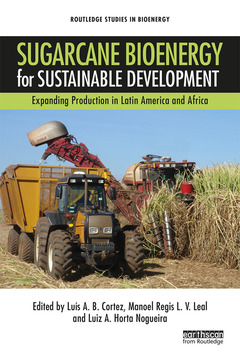Sugarcane Bioenergy for Sustainable Development Expanding Production in Latin America and Africa Routledge Studies in Bioenergy Series
Coordonnateurs : Cortez Luis A. B., Leal Manoel Regis L. V., Nogueira Luiz A. Horta

In recent years, there has been a rapid expansion of the growing of crops for use in bioenergy production rather than for food. This has been particularly the case for sugarcane in Latin America and Africa. This book examines the further potential in the context of the food versus fuel debate, and as a strategy for sustainable development.
Detailed case studies of two countries, Colombia and Mozambique, are presented. These address the key issues such as the balance between food security and energy security, rural and land development policies, and feasibility and production models for expanding bioenergy. The authors then assess these issues in the context of broader sustainable development strategies, including implications for economics, employment generation, and the environment. The book will be of great interest to researchers and professionals in energy and agricultural development.
Introduction: Production of sugarcane bioenergy in Latin America and Africa PART I Bioenergy overview: the context 1. The future of fuel ethanol 2. Bioenergy in the world: present status and future 3. Is there really a food versus fuel dilemma? 4. Integrating pasture intensification and bioenergy crop expansion 5. The role of the sugarcane bioeconomy in supporting energy access and rural development 6. Is the sugarcane capital goods sector prepared to respond to large-scale bioenergy supply in developing countries? 7. Energy medium and long-term perspectives: are we moving towards an "all-electric model"? 8. Comparative assessment of non-ethanol biofuel production from sugarcane lignocelluloses in Africa, including synfuels, butanol and jet fuels 9. 2G 2.0 10. Medium- and long-term prospects for bioenergy trade Part II Why bioenergy? 11. Why promote sugarcane bioenergy production and use in Latin America, the Caribbean and Southern Africa? 12. The potential of bioenergy from sugarcane in Latin America, the Caribbean and Southern Africa 13. Reconciling food security, environmental preservation and biofuel production: lessons from Brazil 14. Energy security and energy Poverty in Latin America and the Caribbean and sub-Saharan Africa 15. Sustainable bioenergy production in Mozambique as a vector for economic development 16. Integrated analysis of bioenergy systems: the path from initial prospects to feasibility and acceptability Part III Availability of land and sugarcane potential production 17. Initial considerations to estimate sugarcane potential in Mozambique and Columbia 18. Sustainability aspects: restrictions and potential production 19. Case study: Potential of sugarcane production for Mozambique 20. Case study: potential of sugarcane production for Colombia 21. Final Comments Part IV Impacts and feasibility of sugarcane production 22. Sugarcane production model and sustainability indicators 23. Sugarcane and energy poverty alleviation 24. Why modern bioenergy and not traditional production and use can benefit developing countries? 25. Sugarcane bioenergy production systems: technical, socioeconomic and environmental assessment 26. Sustainability of scale in sugarcane bioenergy production 27. Vinasse, a new effluent from sugarcane ethanol production 28. Final Remarks on Production Model Alternatives Part V Assessing the LACAf Project findings 28. Final remarks on production model alternatives 29. Alcohol and LACAf project in Colombia 30. Sugarcane ethanol in Guatemala 31. Methodology of assessment and mitigation of risks facing bioenergy investments in sub-Saharan Africa 32. Can sugarcane bring about a bioenergy transformation in sub-Saharan Africa? 33. Sugar Cane Bioenergy, an asset for Latin America, the Caribbean and Africa? 34. Closing remarks
Luís A.B. Cortez is a former Professor in the Faculty of Agricultural Engineering (FEAGRI) and Interdisciplinary Center of Energy Planning, (NIPE) at the State University of Campinas (UNICAMP), Brazil. Presently, he is Institutional Relations Advisor of the Brazilian Center for Research in Energy and Materials (CNPEM), Brazil.
Manoel Regis L.V. Leal is a Researcher for the LACAf Project at the Interdisciplinary Center of Energy Planning (NIPE) of the State University of Campinas (UNICAMP), Brazil, and Researcher for the Brazilian Bioethanol Science and Technology National Laboratory (CTBE), Brazil.
Luiz A. Horta Nogueira is consultant to the United Nations Economic Commission for Latin America and the Caribbean, and Associate Researcher at the Interdisciplinary Center of Energy Planning (NIPE) of the State University of Campinas (UNICAMP), Brazil.
Date de parution : 06-2020
15.6x23.4 cm
Date de parution : 10-2018
15.6x23.4 cm
Thèmes de Sugarcane Bioenergy for Sustainable Development :
Mots-clés :
Sugarcane Bioenergy; Ethanol Production; Sugarcane Production; Colombia; SC Ethanol Production; Mozambique; Sugarcane Ethanol; Latin America; Sugarcane Sector; South America; MB; Africa; Sustainable Bioenergy; Bioenergy Projects; Agricultural development; Sugarcane Cultivation; Ethanol; Ethanol Production Costs; Luís A; B; Cortez; Bioenergy Systems; Luiz Augusto Horta Nogueira; Fuel Ethanol; Manoel Regis L; V; Leal; Biofuel Production; Luiz A; Horta Nogueira; Land Cover Map; Rogério Cezar de Cerqueira Leite; Ethanol Distilleries; Carlos Eduardo Driemeier; Sugarcane Bagasse; Antonio Bonomi; Sugarcane Cropping; José Goldemberg; Energy Source; Frank Rosillo-Calle; Sugarcane Expansion; Eleanor E; Campbell; Bioenergy Production; John Joseph Sheehan; Electric Vehicles; Deepak Jaiswal; Clean Cooking Fuels; Johnny R; Soares; African Development Bank; Julianne de Castro Oliveira; Biomass Production Costs; Leonardo Amaral Monteiro; Andrew M; Allee; Rubens Augusto C; Lamparelli; Gleyce K.D; Araújo Figueiredo; Lee R; Lynd; Francis Johnson; Rocio A; Diaz-Chavez; José Luiz Olivério; Paulo Augusto Soares; Cylon Gonçalves da Silva; Johann F Görgens; Mohsen Mandegari; Sergio C; Trindade; Douglas Newman; Luis Cutz; João Guilherme Dal Belo Leite; Marcelo Pereira da Cunha; Luiz Gustavo Antônio de Souza; André de Teive E Argollo; João Vinícius Napolitano da Cunha; Marcelo Melo Ramalho Moreira; Felipe Haenel Gomes; Karine Machado Costa; Mariane Romeiro; Rafael Aldighieri Moraes; Marcelo Moreira; Manoel Regis L.V; Leal; Arielle Muniz Kubota; Ricardo Baldassin Junior; Terezinha de Fma Cardoso; Marcos Djun Barbosa Watanabe; Alexandre Souza; Mateus Ferreira Chagas; Oto Cavalett; Edvaldo Rodrigo de Morais; Oscar Antonio Braunbeck; Charles Dayan Faria de Jesus; Carlos Eduardo Vaz Rossell; José Maria Rincn Martínez; Jessica A; Agressot Ramirez; Diana M; DurHernez; Aida Lorenzo; Mario Melgar; Rui Carlos da Maia; Willem Heber van Zyl; Patricia Osseweijer; A; B; Cortez Luís



